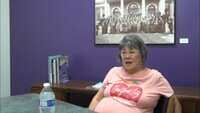| Title |
Flowers, Aiko OH3_048 |
| Creator |
Weber State University, Stewart Library: Oral History Program. |
| Contributors |
Flowers, Aiko, Interviewee; Harris, Kandice, Interviewer; Stokes, Alexis, Video Technician |
| Collection Name |
Weber State University Oral Histories |
| Description |
The Weber State University Oral History Project began conducting interviews with key Weber State University faculty, administrators, staff and students, in Fall 2007. The program focuses primarily on obtaining a historical record of the school along with importand developments since the school gained university status in 1990. The interviews explore the process of achieving university status, as well as major issues including accreditation, diversity, faculty governance, chagnes in leadership, curricular developments, etc. |
| Abstract |
The following is an oral history interview with Aiko Flowers, conducted on July 15, 2021, in the Stewart Library, by Kandice Harris. In this interview, Aiko discusses her life and her memories, her time as an employee for Weber State University, and her role as an Administrative Assistant for the Annie Taylor Dee School of Nursing.; The following is a video clip of an oral history interview with Aiko Flowers, conducted on July 15, 2021. In this video clip, Aiko discusses her favorite memories while working at Weber State University. |
| Image Captions |
Aiko Flowers 15 July 2021; Aiko Flowers speaking about her favorite memories while working at Weber State University |
| Subject |
Administrative assistant; Nursing schools; Education, Higher |
| Keywords |
Annie Taylor Dee School of Nursing; Japanese farmers; Administrative assistants and secretaries |
| Digital Publisher |
Stewart Library, Weber State University, Ogden, Utah, United States of America |
| Date |
2021 |
| Temporal Coverage |
1940; 1941; 1942; 1943; 1944; 1945; 1946; 1947; 1948; 1949; 1950; 1951; 1952; 1953; 1954; 1955; 1956; 1957; 1958; 1959; 1960; 1961; 1962; 1963; 1964; 1965; 1966; 1967; 1968; 1969; 1970; 1971; 1972; 1973; 1974; 1975; 1976; 1977; 1978; 1979; 1980; 1981; 1982; 1983; 1984; 1985; 1986; 1987; 1988; 1989; 1990; 1991; 1992; 1993; 1994; 1995; 1996; 1997; 1998; 1999; 2000; 2001; 2002; 2003; 2004; 2005; 2006; 2007; 2008; 2009; 2010; 2011; 2012; 2013; 2014; 2015; 2016; 2017; 2018; 2019; 2020; 2021 |
| Medium |
oral histories (literary genre) |
| Spatial Coverage |
Okinawa, Japan, https://sws.geonames.org/1854345, 26.5, 127.93333; Syracuse, Davis, Utah, United States, https://sws.geonames.org/5782391, 41.08939, -112.06467; Ogden, Weber, Utah, United States, https://sws.geonames.org/5779206, 41.223, -111.97383 |
| Type |
Text; Image/StillImage; Image/MovingImage |
| Access Extent |
44 page PDF; Video clip is an mp4 file, 111 MB |
| Language |
eng |
| Rights |
Materials may be used for non-profit and educational purposes, please credit University Archives; Weber State University; Music from Uppbeat (free for Creators!): https://uppbeat.io/t/roo-walker/poco; License code: RZXM4IL16IGVPODT |
| Source |
Flowers, Aiko OH3_048 Weber State University Archives |
| Format |
application/pdf; video/mp4 |
| ARK |
ark:/87278/s67p3nym |
| Setname |
wsu_oh |
| ID |
111931 |
| Reference URL |
https://digital.weber.edu/ark:/87278/s67p3nym |
| Title |
Flowers, Aiko OH3_048 |
| Creator |
Weber State University, Stewart Library: Oral History Program. |
| Contributors |
Flowers, Aiko, Interviewee; Harris, Kandice, Interviewer; Stokes, Alexis, Video Technician |
| Description |
The Weber State University Oral History Project began conducting interviews with key Weber State University faculty, administrators, staff and students, in Fall 2007. The program focuses primarily on obtaining a historical record of the school along with importand developments since the school gained university status in 1990. The interviews explore the process of achieving university status, as well as major issues including accreditation, diversity, faculty governance, chagnes in leadership, curricular developments, etc. |
| Abstract |
The following is an oral history interview with Aiko Flowers, conducted on July 15, 2021, in the Stewart Library, by Kandice Harris. In this interview, Aiko discusses her life and her memories, her time as an employee for Weber State University, and her role as an Administrative Assistant for the Annie Taylor Dee School of Nursing. |
| Image Captions |
Aiko Flowers 15 July 2021 |
| Subject |
Administrative assistant; Nursing schools; Education (Higher) |
| Keywords |
Annie Taylor Dee School of Nursing; Japanese farmers; Administrative assistants and secretaries |
| Digital Publisher |
Stewart Library, Weber State University, Ogden, Utah, United States of America |
| Date |
2021 |
| Temporal Coverage |
1940; 1941; 1942; 1943; 1944; 1945; 1946; 1947; 1948; 1949; 1950; 1951; 1952; 1953; 1954; 1955; 1956; 1957; 1958; 1959; 1960; 1961; 1962; 1963; 1964; 1965; 1966; 1967; 1968; 1969; 1970; 1971; 1972; 1973; 1974; 1975; 1976; 1977; 1978; 1979; 1980; 1981; 1982; 1983; 1984; 1985; 1986; 1987; 1988; 1989; 1990; 1991; 1992; 1993; 1994; 1995; 1996; 1997; 1998; 1999; 2000; 2001; 2002; 2003; 2004; 2005; 2006; 2007; 2008; 2009; 2010; 2011; 2012; 2013; 2014; 2015; 2016; 2017; 2018; 2019; 2020; 2021 |
| Medium |
oral histories (literary genre) |
| Spatial Coverage |
Okinawa, Japan, https://sws.geonames.org/1854345, 26.5, 127.93333; Syracuse, Davis, Utah, United States, https://sws.geonames.org/5782391, 41.08939, -112.06467; Ogden, Weber, Utah, United States, https://sws.geonames.org/5779206, 41.223, -111.97383 |
| Type |
Text; Image/StillImage |
| Access Extent |
44 page PDF |
| Language |
eng |
| Rights |
Materials may be used for non-profit and educational purposes, please credit University Archives; Weber State University |
| Source |
Flowers, Aiko OH3_048 Weber State University Archives |
| Format |
application/pdf |
| Setname |
wsu_oh |
| ID |
111984 |
| Reference URL |
https://digital.weber.edu/ark:/87278/s67p3nym/111984 |





